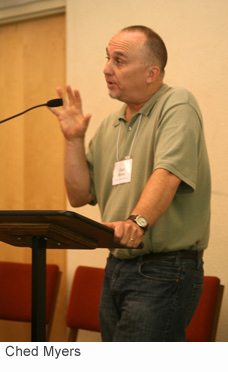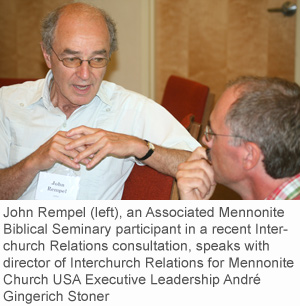by Mennonite Church Executive leadership staff with John Tyson
jtyson@mosaicmennonites.org
 AKRON, Pa. — Sixty people from across Mennonite Church USA met last month in Akron, Pa., as part of a consultation focused on the theme Connecting with ‘old’ and ‘new’ Anabaptists. Ched Myers, Elaine Enns and John D. Roth were presenters.
AKRON, Pa. — Sixty people from across Mennonite Church USA met last month in Akron, Pa., as part of a consultation focused on the theme Connecting with ‘old’ and ‘new’ Anabaptists. Ched Myers, Elaine Enns and John D. Roth were presenters.
The two-and-a-half-day event was spent reflecting on this theme and on how Mennonite Church USA relates to Christians of other traditions. Participants included pastors, regional conference leaders, denominational leaders, seminary professors and theologians and service and mission agency staff. The consultation was sponsored by Mennonite Church USA Executive Leadership and was the third such consultation sponsored since 2004.
Myers and his wife, Elaine Enns, encouraged Mennonite Church USA to build relationships with “new” Anabaptists today. Both work with the Bartimaeus Cooperative Ministries initiative based in California. Myers travels widely in a ministry of teaching, writing and organizing to strengthen Biblical literacy and radical discipleship. Enns is a writer, teacher and practitioner of restorative justice. Enns grew up in a Mennonite community. Myers joined a Mennonite congregation this spring. Enns highlighted a variety of Christian communities and networks whose life is focused on discipleship and following Jesus. Some in this “second wave” of discipleship communities are quite isolated and feel like refugees from the church. “Set the table,” Myers suggested, “and invite these folks to talk to each other and to you about their discipleship experience.” It will be mutually rewarding, Enns and Myers promised.
Jessica Walter, Associate for Communication and Leadership Cultivation with Franconia Conference, a presenter during the consultation, has noticed similar trends. “We,” Walters says, “have seen a rapid rise, over the last half century, in people of faith coming together over values and beliefs parallel to Anabaptist theological values, including peace-seeking and creating, good stewardship in all aspects of life and community building. It was encouraging to participate in MC USA‘s search to recognize these growing faith communities and extend a welcoming hand.”
John D. Roth, Goshen College professor, spoke to the group about facing its own history of division and working for healing of relationships within the Anabaptist family. He suggested three guidelines for these encounters: telling our story as confession rather than judgment, extending a vulnerable hospitality and practicing radial patience.
Gay Brunt Miller, Director of Collaborative Ministreis for Franconia Conference, noticed a pivotal change in those in attendance at this latest interchurch consultation, reflecting a more grassroots approach. “It seems that much of the denomination’s past thinking about interchurch relations has been led by academics. This meeting added more practitioners into the mix, which I think was a good idea.”
 During the consultation, André Gingerich Stoner, director of Interchurch Relations for Mennonite Church USA Executive Leadership, presented a staff report on ongoing interchurch initiatives. Major attention during the past years involved processing membership in Christian Churches Together. Other ongoing involvements include cultivating relationship with the Pentecostal denomination, Church of God Cleveland and the Evangelical Lutheran Church in America as well as working with Friends and the Church of the Brethren to host a broadly interchurch peace gathering in Philadelphia in January 2009. Staff time for Interchurch Relations has been recently increased to two days a week.
During the consultation, André Gingerich Stoner, director of Interchurch Relations for Mennonite Church USA Executive Leadership, presented a staff report on ongoing interchurch initiatives. Major attention during the past years involved processing membership in Christian Churches Together. Other ongoing involvements include cultivating relationship with the Pentecostal denomination, Church of God Cleveland and the Evangelical Lutheran Church in America as well as working with Friends and the Church of the Brethren to host a broadly interchurch peace gathering in Philadelphia in January 2009. Staff time for Interchurch Relations has been recently increased to two days a week.
photos provided by Mennonite Church USA
The opinions expressed in articles posted on Mosaic’s website are those of the author and may not reflect the official policy of Mosaic Conference. Mosaic is a large conference, crossing ethnicities, geographies, generations, theologies, and politics. Each person can only speak for themselves; no one can represent “the conference.” May God give us the grace to hear what the Spirit is speaking to us through people with whom we disagree and the humility and courage to love one another even when those disagreements can’t be bridged.
